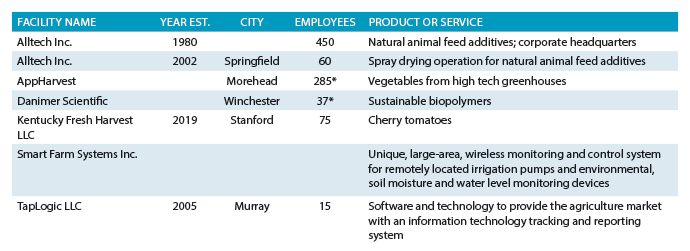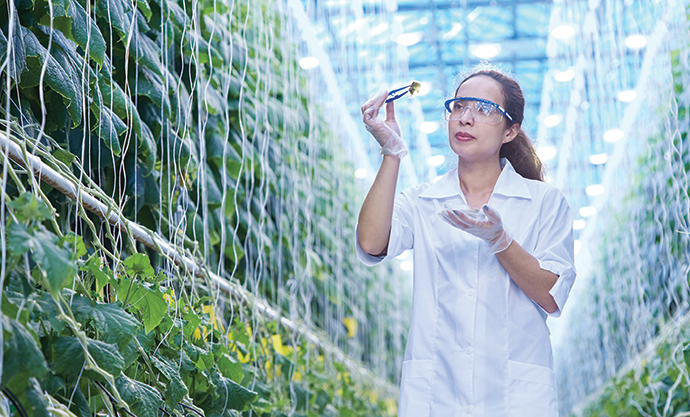Kentucky, characterized by both abundant farmland and its nationally recognized role in advanced-manufacturing, is moving quickly to align its many resources and advantages to blossom into an agritech leader.
Broadly speaking, agritech is the use of technology in agricultural practices in ways that improve yield, efficiency and profitability. And it’s a field moving ahead globally with a sense of urgency.
The United Nations estimates the world needs to increase its food supply by 70% to feed a population that will include an additional 2.3 billion people by 2050. Tech products, services and applications developed and exported from Kentucky can contribute to solving this problem. During his first weeks in office, Kentucky Gov. Andy Beshear and his team began designing the pathway to achieve that vision.
“Agritech not only gives an opportunity to be a true national and international leader, it gives us an opportunity to build our economy in areas of the state that have not seen enough jobs in recent years,” Gov. Beshear said.
To get there, Kentucky will link its deep history and current prowess in agriculture, with its advanced manufacturing, R&D and higher-education resources, including its universities or Kentucky Community & Technical Colleges. State leaders plan to bring together resources to grow Kentucky’s own best ideas, recruit from abroad and facilitate the success of its current industry players. By joining the state’s existing resources and expertise, Kentucky’s agritech sector can both help address the global food security issue and create well-paying, tech-enabled careers for residents across the state.
Building Blocks in Place
Pieces already on Kentucky’s table include about 70 ag-related manufacturers, service and technology providers. Those include processors, labs, chemicals makers and tech innovators.
An example is Alltech, an international animal nutrition and crop sciences company headquartered in Nicholasville just outside of Lexington. Through nutrition and scientific innovation, the company helps farmers feed the world, raise healthy plants and animals, and protect the environment.
Founded in 1980 by the late Irish entrepreneur and scientist, Dr. Pearse Lyons, and his wife, Deirdre, Alltech has grown into a global business with a team of more than 6,000 employees worldwide. With its focus on animal and crop science research down to the molecular level, the company is at the forefront of innovation as it relates to the future of the agritech industry.
That innovative approach extends to Alltech’s marketing efforts, which include the Planet of Plenty initiative. This program highlights the accomplishments of farmers and food producers whose labor will set the table for future generations, and serves as a reminder of the work still needed to feed the rapidly growing global population. Planet of Plenty attempts to inspire the world’s food producers to embrace new technologies to improve industry practices. The initiative does so by sharing the untold stories of the people working to solve current and future challenges related to global food production, while preserving the land and other natural resources in the process.
Though Alltech has grown to become a globally recognized name within the agritech industry, the company has kept its roots in the commonwealth. Currently employing 650 people from roughly 30 Kentucky counties across seven facilities in the state, the company has grown steadily over the past four decades. Most recently, Alltech in early 2017 announced plans for a 73,000-square-foot expansion to add office space at its headquarters. Upon completion, the $21 million project is expected to create 100 additional jobs at the company’s headquarters.
Startup Central
In Morehead, a city of 6,800 in Eastern Kentucky, startup agritech company AppHarvest is building North America’s largest greenhouse to grow produce day and night, year-round.
“Our goal is to promote a future of sustainable change in the agriculture industry. We can reduce water consumption and pesticide use. Our high-tech greenhouses will reduce our impact on the planet,” said AppHarvest founder and Kentucky native Jonathan Webb.

“AppHarvest has created a framework to sell and distribute our produce to the top 25 grocers nationally and bring a significant amount of agricultural production back to the United States.”
The $97 million greenhouse will span 2.76 million square feet — about 60 acres — and is scheduled to open in summer 2020. The facility will use $15 million in LED lights in addition to sunlight and require 90% less water than a typical farm, thanks to a circular irrigation system and 10-acre rainwater retention pond. Company leaders plan to employ 285 people and ship up to 45 million pounds of tomatoes annually.
Smart Farm Systems, a Nicholasville-based agritech startup, provides farmers with precision irrigation monitoring and control systems that revolutionize their ability to conserve water and energy, improve crop yields, as well as reduce equipment maintenance and labor costs. Smart Farm’s system is a critical component in sustainable farming practices by helping farmers apply just the right amount of water at just the right time on a field-by-field basis. The company recently received two state-backed investments to seed its growth.
Kentucky also brings to the table deep expertise in advanced manufacturing thanks to automotive-industry development the past three decades that brought advanced manufacturing across the state. Parts suppliers and assembly plants by Toyota, Ford and General Motors have spurred a secondary supply chain of factory-systems providers adept with robotics, programming and other tech-enabled products.
Prime Location
Another major advantage Kentucky owns for building its agritech industry is its geographic location and the state’s logistics and distribution industry.
Situated at the center of a 34-state distribution area in the eastern U.S., Kentucky’s location provides shippers an advantage in distributing goods and materials to a massive industrial and consumer market. Kentucky’s borders lie within 600 miles (1000 km) of more than two-thirds of the nation’s population, personal income and manufacturing operations. That’s key for shipping produce or technology components and products in rapid, reliable fashion.
“Our goal is to promote a future of sustainable change in the agriculture industry. We can reduce water consumption and pesticide use. Our high-tech greenhouses will reduce our impact on the planet.”
The state’s logistics and distribution industry employs nearly 75,000 at 540-plus facilities. A pillar of the state’s economy, the industry includes three air-cargo hubs, by UPS, DHL and Amazon. Those contribute to Kentucky ranking as the second-leading state nationally by air cargo weight and will likely become No. 1 nationally as Amazon Air’s hub is built.
With highly developed logistics and distribution infrastructure and facilities — including four major ground and air-shipping hubs — Kentucky continues to attract businesses that rely on multiple dependable, air, road, waterway and rail shipping options.
Resources & Partnerships
On the training and workforce pipeline side of the equation, Kentucky’s universities and colleges will play a key role in helping the state’s agritech industry realize its full growth potential.
For example, researchers at the University of Kentucky College of Agriculture are currently tackling a persistent food security problem that reduces U.S. grain yields about 20% every year. The issue is known as stalk-lodging, the breakage of plant stems prior to harvest due to weather and other causes, and UK is part of a consortium developing technology that will address the root of the issue. The potential gains are enormous, as the university estimates decreasing stalk-lodging in maize by just 1% would lead to an annual production increase of 20 billion pounds, in turn saving farmers about $2 billion worth of crops.
Kentucky has the educational infrastructure to develop a robust workforce pipeline to support a variety of agritech jobs statewide. The state touts three engineering schools, and over the past several years has seen more and more students earn STEM degrees. Meanwhile, Kentucky State University’s Aquaculture Research Center is a leader in sustainable fish farming, containing 33 research ponds used for studying fish disease, reproduction, water quality, physiology and production systems.
Additionally, an integral part of this vision is the Kentucky Community & Technical College System, which includes 16 colleges and more than 70 campuses across the state. With such a widespread presence, the building blocks are in place to develop an agritech industry that can access a skilled workforce throughout the commonwealth.
Bespoke programs and multi-partner collaborations — like Registered Apprenticeships, the state’s Work Ready Skills Initiative and the KY Federation for Advanced Manufacturing Education (KY FAME) — offer existing models applicable to the needs of Kentucky’s growing agritech industry.
